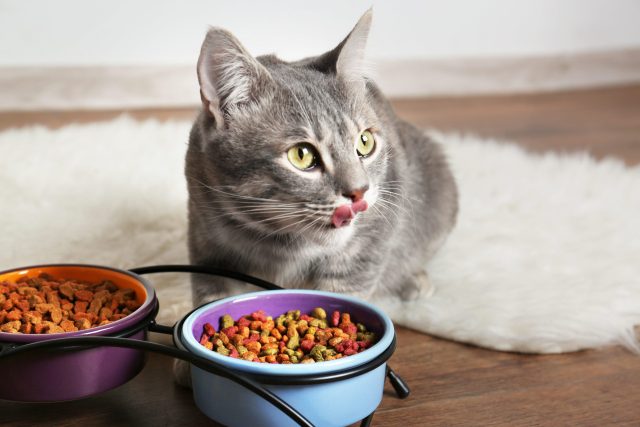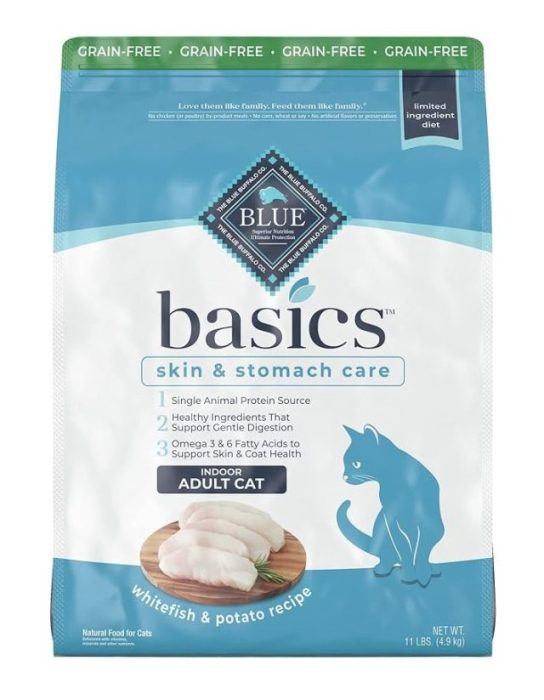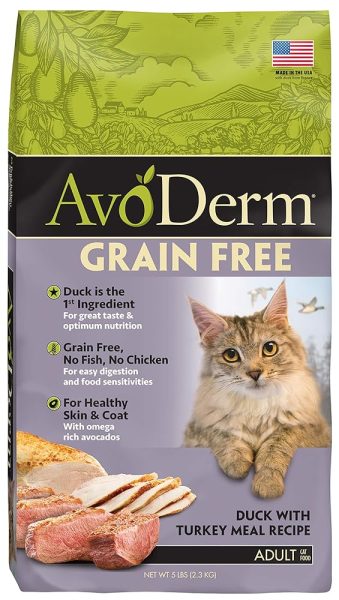iHeartCats is reader-supported. When you buy via links on our site, we may earn an affiliate commission at no extra cost to you.
Feeding a cat with food allergies or sensitivities can be a challenging endeavor. Symptoms of food allergies can manifest in various ways, including skin irritations, digestive issues, and even behavioral changes. Given the complexity of the issue, finding the right cat food is crucial. This article aims to guide you through the best cat food options for felines with allergies, taking into account factors such as ingredient quality, protein source, and absence of common allergens, so you can offer your furry friend relief and a happier life.

#1 – Boat to Bowl Wild Salmon Recipe with Sweet Potato Dry Cat Food, 3.5 lb. & 11-lb
Boat to Bowl’s fish-first Wild Salmon Recipe for Cats is often celebrated as the best cat food for allergies, featuring human-grade, MSC-Certified Sustainable wild caught salmon as the 1st ingredient and sole-source of animal protein.
It is an excellent choice for felines with sensitive stomachs who struggle with food allergies, intolerances, or ingredient sensitivities. This grain-free, gluten-free formula avoids common allergens such as chicken, beef, soy, and dairy, ensuring a meal that’s as gentle on the stomach as it is delightful in flavor.
Seafood is also naturally rich in essential Omega-3 and -6 fatty acids, which have incredible anti-inflammatory properties that promote healthier skin + coat, digestive health, and a boatload of other functional health benefits.
Boat to Bowl offers additional varieties like Wild Cod & Haddock and Wild Seafood (All Life Stage) recipes, as well as Salmon Pate Wet Cat Food and Cod Pate Wet Cat Food for a moist textured alternative.
Best For: Cats with discerning palates and sensitive digestive systems.
#2 – Blue Buffalo Basics Skin & Stomach Care Grain Free, Natural Indoor Adult Dry Cat Food, Fish & Potato 11-lb
Blue Buffalo Basics Skin & Stomach Care Grain Free, Natural Indoor Adult Dry Cat Food is a limited-ingredient cat food designed for cats with sensitive stomachs. It contains real whitefish as the single animal protein source, along with potatoes and pumpkin for gentle digestion. This formula is free from grains that contain gluten, as well as chicken, beef, corn, wheat, soy, dairy, and eggs, making it a good option for cats with food sensitivities. It also includes Blue’s exclusive LifeSource Bits, a blend of antioxidants, vitamins, and minerals, to support immune system health.
Best For: Cats with sensitive stomachs and food sensitivities.
#3 – Instinct Ultimate Protein Grain Free Cage Free Duck Recipe Natural Dry Cat Food, 4 lb. Bag
The Instinct Ultimate Protein Grain Free Cage Free Duck Recipe Natural Dry Cat Food is a high-protein, grain-free cat food that is made with real duck and chicken. It contains natural probiotics for digestive health, omegas for skin and coat, and antioxidants for immune health. The kibble is coated in freeze-dried raw for added nutrition and taste.
#4 – Purina Pro Plan Sensitive Skin and Stomach Cat Food, Lamb and Rice Formula – 7 lb. Bag
Purina Pro Plan Sensitive Skin and Stomach Cat Food, Lamb, and Rice Formula is a cat food designed specifically for cats with sensitive skin and stomachs. The formula includes easily digestible rice and oatmeal, along with high-quality protein from real lamb. It is also fortified with live probiotics for digestive and immune health. This product is best for cats with sensitive skin and stomachs.
#5 – Avoderm Natural Grain-Free Dry Cat Food, All Life Stages Duck Recipe, 5 Lb Bag
Avoderm Natural Grain-Free Dry Cat Food is a nutritious and balanced dry cat food formulated with real duck and turkey meal. It is grain-free, wheat-free, corn-free, and soy-free, making it suitable for cats with food sensitivities. This cat food promotes healthy skin and coat, thanks to the inclusion of omega-rich avocado oil. It is formulated specifically for adult cats, providing them with a high nutritional value.
Best For: Promoting healthy skin and coat.
#6 – Natural Balance Limited Ingredient Adult Grain-Free Dry Cat Food, Salmon & Green Pea Recipe, 10 Pound (Pack of 1)
The Natural Balance Limited Ingredient Adult Grain-Free Dry Cat Food is a salmon and green pea recipe that provides essential protein and amino acids for strong muscles. It is formulated with a simplified list of premium ingredients, with no grain, soy, gluten, artificial colors, or flavors. This cat food is suitable for all types of cats, not just those with sensitive stomachs or allergies, and is tested for safety through Natural Balance’s ‘Feed with Confidence’ program.
Best For: Cats with sensitive stomachs or allergies. (best for sensitive stomachs/allergies)
#7 – Instinct Limited Ingredient Diet Grain-Free Real Turkey Recipe Natural Wet Canned Cat Food by Nature’s Variety, 5.5 oz. Cans, Count 12 (Pack of 1)
The Instinct Limited Ingredient Diet Grain-Free Real Turkey Recipe Natural Wet Canned Cat Food by Nature’s Variety is a grain-free cat food specifically designed for cats with food sensitivities. Made with a simple ingredient list of 1 protein (cage-free turkey) and 1 vegetable, this wet cat food is packed with animal protein for strong, lean muscles. It is a great option for cats with allergies and is made without ingredients known to trigger food sensitivity. https://amzn.to/3EFcerr
Best For: Cats with food sensitivities or allergies.
#8 – Reveal Natural Wet Cat Food, 24 Pack, Limited Ingredient, Grain Free Food for Cats, Tuna Fillet in Broth, 2.47oz Cans
Reveal Natural Wet Cat Food is a 24-pack of limited-ingredient, grain-free cat food made with 100% natural ingredients. It does not contain any artificial flavors, colors, or preservatives. With a delicious variety of flavors and textures, it is the perfect addition to enhance a cat’s daily feeding regimen and can be fed as a complement to any dry cat food for a complete and balanced diet.
Best For: Cats who prefer limited-ingredient, grain-free wet food with natural ingredients.
#9 – Instinct Limited Ingredient Diet Grain-Free Recipe with Real Rabbit Natural Dry Cat Food, 10 lb. Bag
The Instinct Limited Ingredient Diet Grain-Free Recipe with Real Rabbit Natural Dry Cat Food is a grain-free cat food made with one protein and one vegetable, designed for cats with sensitivities. It is made with farm-raised rabbit, an easily digestible protein source, and every piece of kibble is coated in freeze-dried raw for added nutrition and taste. Made in the USA with raw and whole food ingredients, this cat food is a great option for cats with allergies.
Best For: Cats with sensitivities or allergies.
#10 – Forza10 Wet Hypoallergenic Cat Food, Canned Wet Cat Food, for Adult Cats with Allergy and Skin and Coat Conditions, 32 Pack Case of 3.5 Ounce Each (Lamb)
The Forza10 Wet Hypoallergenic Cat Food is a canned wet cat food designed for adult cats with allergies and skin and coat conditions. It is formulated with lamb and does not contain gluten, corn, wheat, or soy. This cat food also includes natural ingredients such as turmeric, papaya, and pomegranate to support overall well-being and immune and digestive health.
What Should I Consider When Purchasing a Cat Food for a Cat with Allergies?
When purchasing cat food for a cat with food allergies, several important factors should be taken into consideration to ensure you are providing the most appropriate diet for your feline friend.
- Consult Your Veterinarian: The first step in managing food allergies is getting a confirmed diagnosis from a veterinarian, who can provide specific dietary recommendations.
- Identify Allergens: If possible, identify the specific allergens affecting your cat through an elimination diet or testing. Common allergens include chicken, beef, dairy, and fish.
- High-Quality Protein Source: Look for a cat food that features a single, high-quality protein source that your cat has not been exposed to before. Examples might include duck, venison, or rabbit.
- Limited Ingredient Diet: Opt for a limited ingredient diet (LID) that contains as few ingredients as possible to minimize the risk of allergen exposure.
- Avoid Fillers and Artificial Additives: Foods with a lot of fillers, like corn, soy, and wheat, should be avoided, as should artificial colors, flavors, and preservatives, as these can exacerbate allergies.
- Read Labels Carefully: Always read ingredient labels to ensure that the food doesn’t contain any known allergens for your cat, even in small quantities.
- Wet vs. Dry: Both wet and dry foods have their pros and cons, but wet foods generally contain fewer artificial preservatives and fillers. Discuss the best option for your cat with your veterinarian.
- Transition Slowly: When switching to a new food, do it gradually over a week or more to monitor for any adverse reactions and to allow your cat’s digestive system to adjust.
- Monitor and Adjust: After you’ve switched foods, keep an eye on your cat for any signs of improvement or worsening of symptoms, and be prepared to adjust as needed.
- Ongoing Veterinary Care: Regular check-ups and consultations with your veterinarian are important to monitor the effectiveness of the dietary changes and to make any necessary adjustments.
By considering these factors and working closely with your veterinarian, you’ll be better equipped to choose a cat food that can help manage your cat’s allergies effectively.
What Are The Benefits of Hypoallergenic Cat Food?
Hypoallergenic cat food offers several benefits, particularly for cats that suffer from food allergies or sensitivities. Here are some key advantages:
- Reduced Allergic Reactions: The primary benefit is the reduction or elimination of symptoms associated with food allergies, such as itching, skin irritations, gastrointestinal issues, and respiratory problems. Hypoallergenic foods are formulated to minimize the risk of triggering an allergic response.
- Limited Ingredients: Hypoallergenic cat foods typically contain fewer ingredients, making it easier to identify any items that could cause an allergic reaction. This limited ingredient list is easier on the digestive system and minimizes the risk of exposing your cat to potential allergens.
- Novel Protein Sources: These foods often use unconventional protein sources like venison, duck, or rabbit that your cat is less likely to have been exposed to, thereby reducing the risk of an allergic reaction.
- No Harmful Additives: High-quality hypoallergenic cat foods usually avoid the use of artificial colors, flavors, and preservatives that can exacerbate allergies or sensitivities.
- Enhanced Skin and Coat Health: Many owners notice an improvement in their cat’s skin and coat health when switching to a hypoallergenic diet, even if the cat doesn’t have a diagnosed allergy. The high-quality ingredients used can contribute to a shinier coat and healthier skin.
- Better Digestive Health: The limited, high-quality ingredients used in hypoallergenic cat foods are generally easier to digest, which can result in fewer gastrointestinal issues like diarrhea or vomiting.
- Targeted Nutrition: Some hypoallergenic cat foods are also formulated to address other health issues, providing a more comprehensive approach to your cat’s overall health.
It’s essential to consult your veterinarian before making a significant change to your cat’s diet, especially when dealing with allergies or other medical conditions. A veterinary diagnosis and guidance can help ensure that you’re choosing the most appropriate food for your cat’s specific needs.
Frequently Asked Questions About Foods for Cats with Allergies
1. What are the common symptoms of food allergies in cats?
Symptoms of food allergies in cats can vary but often include skin irritations (such as itching and redness), digestive issues like vomiting or diarrhea, and sometimes respiratory problems. Behavioral changes like excessive licking can also be an indicator. If you suspect your cat has a food allergy, consult your veterinarian for a diagnosis and treatment plan.
2. What are the common allergens in cat food?
The most common food allergens for cats include chicken, beef, fish, dairy, and eggs. Some cats can also be allergic to certain grains or plant-based proteins. It’s crucial to identify the specific allergen affecting your cat for effective treatment.
3. Should I switch to a hypoallergenic cat food?
If your cat is diagnosed with a food allergy, your veterinarian will likely recommend a hypoallergenic diet. These foods are designed to minimize the risk of allergic reactions by using limited ingredients and novel protein sources that your cat has not been exposed to before.
4. What is a novel protein?
A novel protein is a protein source that your cat has not previously been exposed to and, therefore, is less likely to trigger an allergic reaction. Examples include venison, duck, and rabbit. Hypoallergenic cat foods often use these kinds of proteins.
5. How do I transition my cat to a new hypoallergenic food?
Transition your cat gradually to the new food over a period of 7-10 days. Start by mixing a small amount of the hypoallergenic food with their current food and gradually increase the proportion of the new food while reducing the old food. This helps your cat’s digestive system adjust and lets you monitor for any adverse reactions.
6. Can I give my cat treats while on a hypoallergenic diet?
It’s essential to stick to the hypoallergenic diet strictly, which includes treats. Consult your veterinarian for recommendations on hypoallergenic treats, or consider using small amounts of the hypoallergenic food itself as a treat.
7. Is wet or dry hypoallergenic food better for my cat?
Both wet and dry hypoallergenic foods have their pros and cons. Wet food is often easier on the digestive system and keeps your cat hydrated, while dry food is more convenient and can be better for dental health. Your veterinarian can help you decide which is best for your cat.
8. How long will it take to see improvements in my cat’s symptoms?
It can take several weeks for the allergic symptoms to subside after switching to a hypoallergenic diet. Always consult your veterinarian for a proper diagnosis and ongoing monitoring to see how well the dietary changes are working.
9. Can hypoallergenic foods help with other conditions?
Some hypoallergenic foods are formulated to address multiple health issues, such as skin conditions or urinary tract health. Discuss with your veterinarian to find a food that meets all of your cat’s health needs.
10. Are hypoallergenic cat foods available only through a veterinarian?
While some hypoallergenic foods are prescription-only and must be purchased through a veterinarian, there are over-the-counter options available. However, it’s essential to consult your veterinarian before making any significant changes to your cat’s diet, especially when dealing with allergies or other medical conditions.
Conclusion: Best Cat Food for Allergies
Navigating the world of cat food for allergies doesn’t have to be a daunting task. By focusing on hypoallergenic options that use high-quality, limited ingredients, you can significantly alleviate — and in some cases, completely eliminate—your cat’s allergic symptoms. Remember, always consult your veterinarian for an accurate diagnosis and tailored treatment plan for your cat’s allergies. With the right food and veterinary guidance, your cat can enjoy a more comfortable and symptom-free life.










